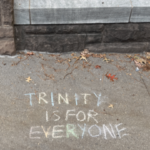Emmanuel Gezahegne Mitikie ‘26
Contributing Writer
On Privilege:
We are here. We are grateful.
I am grateful to be here. During my two years here I have been able to take so many different classes with amazing professors and meet stellar people. I often ask my low-income and international friends, “How do you feel?” Their answers are usually complicated. I am an international student from the sunny city of Addis Ababa, Ethiopia. The resources, the education, the professors and the facilities at Trinity give me a life that most of my friends back home cannot access. The simple fact that I am a student here endows me with privilege. However, being a Black and low-income student at Trinity comes with its own unique set of challenges. These challenges ultimately manifest in a cognitive dissonance that comes with acknowledging both the privilege and the hurdles that come with being a low-income student in higher education.
On $65:
We are here. We did not eat.
The week before Thanksgiving break, students who signed up to stay on campus received an email stating the different prices for the meal plans during school breaks. Trinity for the last few years was able to provide financial assistance to students during these breaks. This took shape in the form of a Visa gift card. Last year the gift card helped me get through the break. However, this year we had to pay. I know some students who couldn’t afford to pay or were scared to take out loans. This was also in part because loans and debt are an additional layer of stress that most low-income and international students are not used to navigating. There was a food pantry but it was ineffective for the number of students staying on campus, which in itself comes with the stigma of using one and being judged for needing to use one by peers at such a rich and elite school.
The harsh irony is that the season of giving and overindulgence for some is a time of literal hunger for others. I say this because I remember walking back to my dorm and meeting a first-year student who had not eaten anything since the morning and had no food for the rest of the day. I remember texting friends each time there was free food to be found on campus. I also remember my friend who told me all that she had eaten for the last few days were M&M’s.
“The harsh irony is that the season of giving and overindulgence for some is a time of literal hunger for others.”
So I have come to deeply dislike breaks. They bring with them the need to email administration and explain the basic needs of so many students— to simply eat. I hate having to lie to my parents over a call and tell them, “All is well” during the break when in truth it is not. It is during these breaks that whatever cognitive dissonance I have from being a low-income student stops being abstract. This dissonance manifests physically through hunger, and hunger is a very simple feeling to understand. In hunger, words do not matter, numbers, education, commitments and institutional ideals stop to mean anything. Except for the $65 we couldn’t afford; The price difference between a student and immediate food insecurity.
On food insecurity:
We are here. We will always be here.
My intention in writing this opinion piece is to raise attention and hopefully institute change. If we as a community in Trinity value diverse identities then we need to put money, and resources, into fulfilling our word. I want to acknowledge the work of our Mather staff who provide the student body with food. I am not asking for them to be overworked during the breaks when they should rest. Nor am I asking for the return of Visa gift cards, which I understand is expensive. I am asking for a simple in-between solution where the most vulnerable students in the community can get food. This can be achieved through food-specific vouchers, food basket drop-offs, financial aid and other means. We cannot simply expect the most vulnerable and financially needy in the community to fend for themselves. Especially when we know that Hartford is a food desert.
I as a responsible student, am doing my part in raising my voice and calling for action. I am not in a position of power to make changes, but I hope the people in power who see this exercise their power to put in tangible changes. Especially as the longer and more gruelling breaks quickly arrive.
Until tangible change is put in place,
This opinion piece holds you accountable;
The most vulnerable students find you accountable,
Remember, we will always be here.



+ There are no comments
Add yours